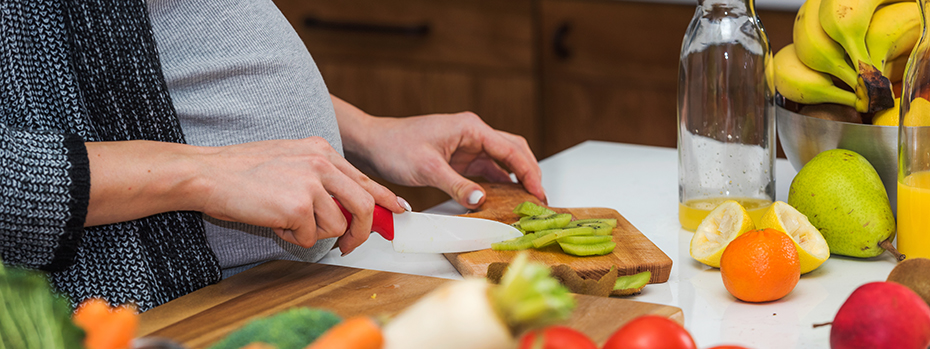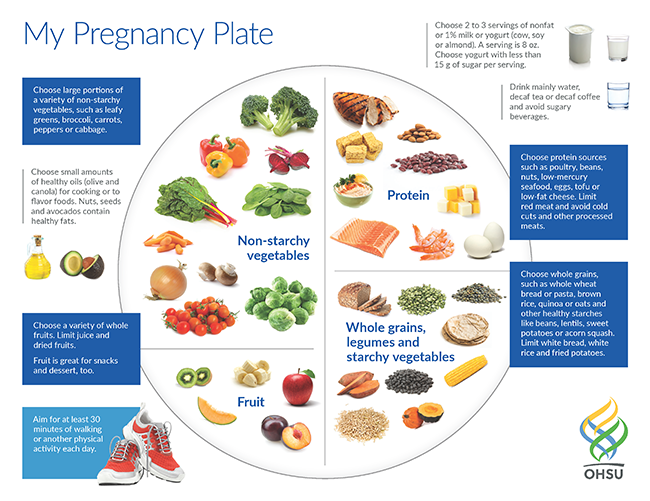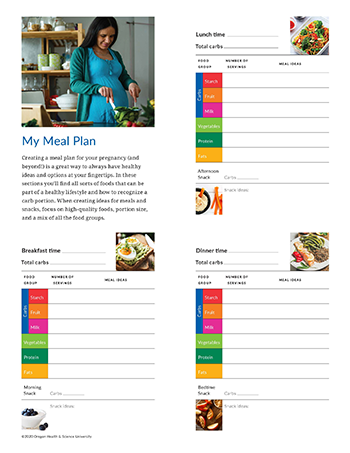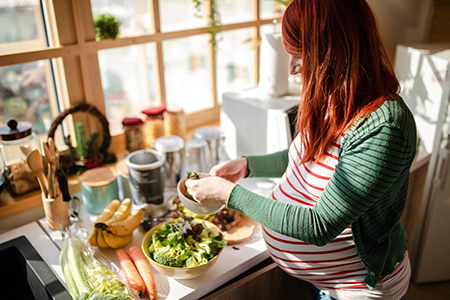Nutrition During Pregnancy

Nutrition is an important part of your care plan at the OHSU Center for Women’s Health. Our goal is to help you feel confident in your food choices so you and your baby can be as healthy as possible.
We offer:
- One-on-one counseling with a registered dietitian.
- Nutrition plans based on your goals and needs.
- Advice based on the latest and best research.
- Expertise in nutritional support for multiple babies and high-risk pregnancies.
Healthy eating for you and your baby
When you are pregnant, your body needs extra nutrients to help your baby grow. Eating a variety of high-quality foods can help you feel better. It can also improve your baby’s development and health throughout life.
Poor nutrition can be caused by eating too much, eating too little, or eating foods with too few nutrients. No matter the cause, this can affect your baby’s growth. It can also increase your baby's chances of preventable, chronic diseases later in life.
Making good choices during pregnancy
Pregnancy is an important time to make good food choices. It is not a time to overeat foods that are high in calories and low in nutrients.
Balance, variety and moderation are the keys to healthy eating. After the first trimester, you should eat a few more servings of nutrient-rich foods — about 300 extra calories a day. You also need more vitamins and minerals, such as:
- Folate
- Iron
- Calcium
- Iodine
- Vitamin D
Obstacles to good nutrition during pregnancy
Some people feel anxious about eating well during pregnancy. You may have obstacles to healthy nutrition, such as lower energy levels, food aversions or nausea. If you have diabetes, more than one baby or a high-risk pregnancy, you may have special dietary needs.
If you have concerns or questions, please talk with your care team or ask to meet with one of our registered dietitians.
Your guide to good nutrition during pregnancy
Use our tools to guide your food choices while you’re expecting.
My Pregnancy Plate shows healthy food options at a glance, as well as healthy eating tips.

My Pregnancy Plate Food Choice Guide is a detailed food guide with meal planning tools. It is especially helpful if you have gestational diabetes and need to manage your blood sugar.

Our services
Your care team will talk with you about your nutritional needs and goals throughout your pregnancy.
If you want or need more help, you may be referred to one of our registered dietitians. Both talk with other providers in the Center for Women’s Health, and offer counseling on nutrition and managing diabetes.
First appointment
Your first appointment will last about an hour. You can expect to:
- Talk in detail about your eating habits, challenges and goals.
- Bring (or share photos of) any nutritional supplements you take.
- Recall what and when you ate over the previous 24 hours.
- Discuss any issues that might affect your eating patterns.
- Leave with ideas, advice and an eating plan.
After the first meeting, your dietitian will check in with you as needed.
Other tips for healthy nutrition in pregnancy
Take it easy in the first trimester: It is normal to have nausea, low energy or food aversions early on. Listen to your body. Be confident that it’s telling you what it needs. You don’t need extra calories yet. Focus on:
- Staying hydrated
- Resting when tired
- Exercising when you feel best
- Managing your symptoms
Add limited calories in your second trimester: Starting in the 16th week, you need about 300 more calories a day. That’s about one large snack or two small snacks. Add a mix of nutrient-rich foods, such as fruits, vegetables, whole grains, low-fat dairy and protein. Every pregnancy is different, so talk with your care team about how much more you need to eat at each stage.
Reduce sugar: Sweets such as cookies, candy and ice cream are fine here and there — but not every day. Avoid sugary drinks and yogurt with more than 15 grams of sugar per serving. Limit juice and dried fruit.
Don’t go to extremes: Avoid strict limits on one type of nutrient, such as carbohydrates. Eating whole grains, protein, vegetables and fruit, and small amounts of healthy fats will give you steady energy and help your baby grow.
Take prenatal vitamins: We generally recommend a daily prenatal vitamin, though not as a substitute for healthy eating. Some key vitamins and minerals — such as folate, iron, calcium, iodine and vitamin D — are difficult to get through food alone.
Include DHA (omega-3): This fat, also called omega-3, is important to your baby’s brain and eye development, especially after 20 weeks of pregnancy. Try to include 300 mg of DHA each day while pregnant or breastfeeding. The best sources are wild, troll-caught albacore tuna and salmon. Both are safe during pregnancy. You can also get DHA from fish oil capsules or those made from algae.
Exercise: Find something you enjoy and aim for 30 minutes of activity a day. Include strength training if you can.
Take guilt off the table: You will be more successful if you are kind to yourself.

Foods to avoid during pregnancy
When you are pregnant, you are more likely to get sick from bacteria and parasites in food, putting your baby at risk. If you have concerns about specific foods, please talk with your care team.
Avoid:
- Raw fish, especially shellfish and sushi
- Unpasteurized milk, juice and soft cheeses such as feta, bleu cheese, brie and queso blanco (soft cheeses made from pasteurized milk are fine)
- Raw sprouts
- Herbal supplements and herbal teas, until you check with your care team
- Swordfish, tilefish, king mackerel and shark, because of high mercury content
- Cold cuts and other processed meats
Food safety during pregnancy
Most foodborne illnesses happen at home. Risks include salmonella from raw chicken; listeria in deli meat and cheese; and toxoplasmosis, which is caused by a parasite.
- Wash your hands before making food and eating.
- Wash fresh produce thoroughly.
- Buy whole fruit, rinse it well and cut it up yourself.
- Cook food thoroughly, especially eggs and food made with eggs, meat, poultry and seafood. Avoid runny egg yolks and pink meat.
- Place raw meat straight from the package into the pan to avoid cross contamination.
- Don’t use the same unwashed knife or cutting board for raw meat and for vegetables.
- Cook deli meat in the microwave until it hisses.
Nausea during pregnancy
Nausea and vomiting are common during pregnancy, especially during the first trimester. Though it’s often called morning sickness, nausea can happen at any time. Nausea and vomiting are very unlikely to harm your baby, though they can make you uncomfortable.
Tips to reduce nausea:
- Eat before you feel too hungry.
- Drink water before you start eating.
- Try ginger root in your food or tea.
- Brush your teeth.
- Go outside for fresh air, and avoid stuffy rooms.
- Don’t take vitamins or medications on an empty stomach.
- Avoid odors or foods that trigger nausea.
- Try a nausea-relief wristband.
Learn more
- Pregnancy and Nutrition, MedlinePlus, U.S. National Library of Medicine
- Nutrition During Pregnancy, the American College of Obstetricians and Gynecologists
- Diet During Pregnancy, American Pregnancy Association
- Pregnancy, Nutrition.gov
- Pregnancy and Breastfeeding, U.S. Department of Agriculture
- Health Tips for Pregnant Women, National Institute of Diabetes and Digestive and Kidney Diseases
- Advice About Eating Fish, U.S. Food and Drug Administration
- Oregon WIC Program, Special Supplemental Nutrition Program for Women, Infants and Children, Oregon Health Authority
- Oregon Food Bank
For patients
Call 503-418-4500 to make an appointment.
Location
Parking is free for patients and their visitors.
Center for Women’s Health
808 S.W. Campus Drive
Portland, OR 97239
Map and directions
For referring providers
We partner with you to care for patients with high-risk pregnancies.
- Refer your patient to OHSU.
- Call 503-494-4567 to seek provider-to-provider advice.
Research and clinical trials
At OHSU, many providers are also researchers who strive to turn discoveries into better patient care. You may be eligible to join a pregnancy study.
‘Eating for two’ isn’t really a thing
Find out why OHSU dietitian Christie Naze says healthy eating during pregnancy is more about “thinking for two.”